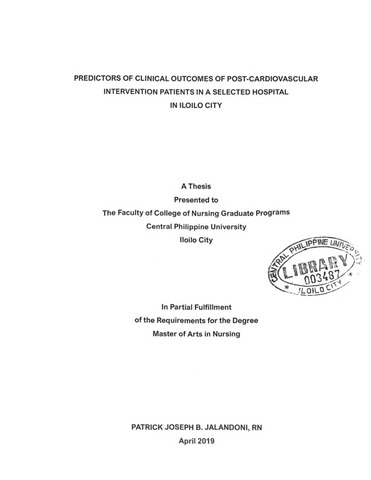Predictors of clinical outcomes of post-cardiovascular intervention patients in a selected hospital in Iloilo City
| dc.contributor.adviser | Porque, Gelbert Jan S. | |
| dc.contributor.author | Jalandoni, Patrick Joseph B. | |
| dc.coverage.spatial | Iloilo | en_US |
| dc.date.accessioned | 2021-03-01T00:12:25Z | |
| dc.date.available | 2021-03-01T00:12:25Z | |
| dc.date.issued | 2019 | |
| dc.identifier.citation | Jalandoni, P. J. B. (2019). Predictors of clinical outcomes of post-cardiovascular intervention patients in a selected hospital in Iloilo City (Unpublished Master's thesis). Central Philippine University, Jaro, Iloilo City. | en_US |
| dc.identifier.uri | https://hdl.handle.net/20.500.12852/511 | |
| dc.description | Abstract only | en_US |
| dc.description.abstract | The study primarily aimed to determine the predictors of clinical outcomes of post cardiovascular intervention patients in a selected hospital in Iloilo City; describing patient, cardiac and procedure related factors, clinical outcomes, EuroSCORE II and determining significant correlations and differences among variables. A single site, retrospective-relational type of study with a comprehensive chart review was used as methods. The total sample size was 173 charts from January 2017 to December 2018 that were reviewed and analyzed. Heart attacks can happen between 30 - 90 years old where higher chances occur by the age of 60. PCI clinical outcomes include LOS of 3-5 days, readmission rate and mortality rate of 5 percent. Severe mortality, active endocarditis, insulin therapy, presence of comorbidities (HCVD and CAD) were correlated with increasing PCI bed days. Higher NYHA classification increases readmission incidences, while sex and NYHA classifications were factors contributory to mortality. Coronary artery disease prolongs PCI hospitalization days five times more than those who do not have the disease. Unlike its superior predictive mortality risk discrimination to open-heart surgeries, EuroSCORE II may not be applicable in predicting mortality outcomes of percutaneous coronary intervention - predicted PCI mortalities have been overestimated. Despite substantial specificity accuracy, calibration and discriminating power, binary logistic regression model applied to PCI requires to be clinically assessed, correlated and with sensitivity errors being highly considered for application to PCI. | en_US |
| dc.format.extent | xi, 71 leaves | en_US |
| dc.language.iso | en | en_US |
| dc.subject.ddc | GSL Theses 610.73072 J216 | en_US |
| dc.subject.lcsh | Cardiac arrest | en_US |
| dc.subject.lcsh | Myocardial infarction | en_US |
| dc.subject.lcsh | Cardiovascular system | en_US |
| dc.subject.lcsh | Cardiovascular system--Diseases--Treatment | en_US |
| dc.subject.lcsh | Cardiovascular system--Diseases | en_US |
| dc.subject.lcsh | Coronary heart disease | en_US |
| dc.subject.lcsh | Philippines--Iloilo | en_US |
| dc.subject.lcsh | Postoperative care | en_US |
| dc.subject.mesh | Cardiovascular Diseases | en_US |
| dc.subject.mesh | Myocardial Infarction | en_US |
| dc.subject.mesh | Postoperative Care | en_US |
| dc.title | Predictors of clinical outcomes of post-cardiovascular intervention patients in a selected hospital in Iloilo City | en_US |
| dc.type | Thesis | en_US |
| dc.description.bibliographicalreferences | Includes bibliographical references | en_US |
| dc.contributor.chair | Alibogha, Salex E. | |
| dc.contributor.committeemember | Canaman, Jessica B. | |
| dc.contributor.committeemember | Sale, Melba C. | |
| dc.contributor.committeemember | Baldon, Charlie D. | |
| dc.contributor.committeemember | Catoto, James C. | |
| dc.contributor.department | School of Graduate Studies | en_US |
| dc.description.degree | Master of Arts in Nursing | en_US |


